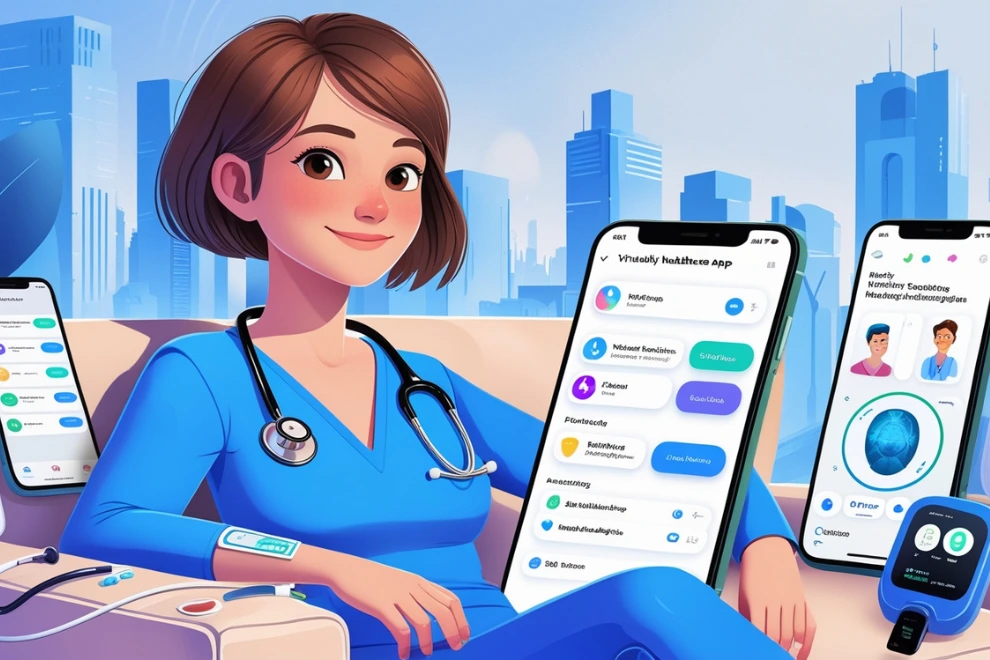Technology is reshaping every aspect of our lives, and healthcare is no exception. Innovative tools and applications have transformed how we approach health and wellness. From telehealth solutions to artificial intelligence, these advancements are improving patient care, enhancing accessibility, and streamlining processes.
In this article, we’ll explore the profound ways technology is revolutionizing healthcare and highlight some apps you should know.
The Digital Revolution in Healthcare
1. Telemedicine and Virtual Care
Telemedicine has revolutionized healthcare delivery, especially in recent years. Through video consultations and online platforms, patients can now access medical expertise without stepping into a clinic. This innovation is invaluable for:
- People in rural or remote areas
- Patients with mobility challenges
- Busy individuals looking for flexible healthcare solutions
Apps like Teladoc Health and Amwell enable virtual doctor visits, covering everything from general health concerns to specialized mental health consultations.
2. Wearable Health Technology
Wearables such as smartwatches and fitness trackers have given individuals the tools to monitor their health metrics consistently. These devices can track steps, calories, heart rate, and even sleep patterns, empowering users to make informed decisions about their health. Advanced features can detect early signs of conditions like arrhythmias or sleep apnea.
Apps like Fitbit, Apple Health, and Garmin Connect pair with these devices to offer tailored insights and recommendations.
3. AI-Powered Diagnostics
Artificial intelligence is revolutionizing diagnostics by analyzing medical data to provide fast, accurate insights. AI can interpret imaging scans, evaluate lab results, and even suggest early interventions for diseases like cancer or cardiovascular conditions. This reduces human error and improves patient outcomes.
Apps like Ada Health utilize AI to help users understand their symptoms and seek appropriate care.
4. Mental Wellness Apps
The growing acceptance of mental health awareness has led to the development of numerous apps designed to promote emotional well-being. From guided meditation to online therapy, these platforms cater to diverse mental health needs.
Popular mental health apps include:
- Calm: Offers relaxation techniques, sleep stories, and mindfulness exercises.
- BetterHelp: Connects users with licensed therapists for professional support.
- Headspace: Provides tools for stress management and meditation.
Apps Redefining Healthcare
Let’s dive into some of the most impactful healthcare apps:
1. MyFitnessPal
Category: Nutrition and Fitness
MyFitnessPal helps users maintain a balanced diet and active lifestyle by tracking meals, calories, and exercise. Its extensive food database and integration with fitness devices make it an essential tool for health-conscious individuals.
2. Medisafe
Category: Medication Management
Medisafe ensures users never miss a dose of their medication. It provides reminders, tracks dosages, and even alerts caregivers if a dose is skipped, making it ideal for managing chronic conditions.
3. Zocdoc
Category: Appointment Booking
Zocdoc simplifies finding and booking medical appointments. Users can search by specialty, read reviews, and schedule in-person or virtual visits, all through an intuitive interface.
4. Clue
Category: Women’s Health
Clue helps women track their menstrual cycles, fertility, and overall reproductive health. The app’s scientific approach and easy-to-use design empower users with actionable insights.
5. Doximity
Category: Professional Networking
Doximity serves as a networking platform for healthcare professionals, enabling them to connect, share knowledge, and stay updated on medical advancements. It also supports secure communication for telehealth services.
6. Noom
Category: Weight Management
Noom combines behavioral psychology with technology to help users build healthier habits. By offering personalized coaching, it helps individuals achieve long-term wellness goals.
7. Sleep Cycle
Category: Sleep Health
Sleep Cycle uses sound analysis to monitor sleep patterns and improve sleep quality. It wakes users at the optimal moment in their sleep cycle, ensuring they start their day feeling refreshed.
8. Practo
Category: Comprehensive Healthcare
Practo offers a range of services, including telemedicine, appointment scheduling, and medicine delivery. It is particularly valuable in regions where healthcare accessibility remains a challenge.
Advantages of Healthcare Apps
1. Improved Access
Healthcare apps bring medical resources directly to users, bridging the gap for those in underserved areas or with mobility issues.
2. Convenience
Scheduling appointments, consulting doctors, and ordering prescriptions are now possible with just a few taps, saving time and effort.
3. Cost Efficiency
Many apps offer free or affordable services, reducing financial barriers to healthcare. Preventive care through these apps can also minimize long-term medical expenses.
4. Personalization
By leveraging user data, healthcare apps provide personalized recommendations, whether for fitness goals, medication management, or mental wellness.
5. Empowerment
These apps encourage users to take proactive steps toward their health, fostering a culture of self-care and preventive measures.
Challenges and Ethical Considerations
While technology has transformed healthcare, it’s important to address challenges such as:
1. Data Security
With sensitive health data stored on apps, robust privacy measures and compliance with regulations like HIPAA are essential.
2. Accessibility Gaps
Not everyone has access to smartphones or high-speed internet, which limits the reach of healthcare apps.
3. Accuracy Concerns
Apps should not replace professional medical advice. Users must discern when to consult a healthcare provider for critical issues.
4. Overdependence on Technology
Excessive reliance on digital tools may lead some to neglect traditional healthcare avenues when necessary.
The Road Ahead for Healthcare Technology
The future of healthcare technology is brimming with possibilities. Trends to watch include:
1. Virtual and Augmented Reality (VR/AR)
From surgical simulations to mental health therapies, VR and AR are expanding their applications in medicine.
2. Blockchain for Health Records
Blockchain ensures secure, transparent storage and sharing of medical data, reducing risks of breaches.
3. Personalized Medicine
Genomics and advanced diagnostics will enable treatments tailored to individual DNA profiles.
4. IoT Integration
Connected medical devices and wearables will provide real-time health monitoring and data sharing.
You Should Know

Healthcare technology is reshaping the industry, making it more accessible, efficient, and patient-centric. By embracing tools like telemedicine, AI diagnostics, and wellness apps, individuals and providers can foster a future of improved health outcomes.
Explore the apps mentioned, take charge of your health journey, and be part of the digital transformation in healthcare.


